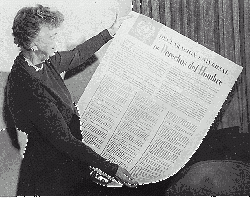Difference between revisions of "Template: Popular article 12 10" - New World Encyclopedia
From New World Encyclopedia
(Created page with "{{Main page article box| type=Popular| title=Thomas Aquinas| image_name=St-thomas-aquinas.jpg| image_desc=St. Thomas Aquinas| text='''Saint Thomas Aquinas''', (c. 1225 –...") |
|||
| Line 1: | Line 1: | ||
{{Main page article box| | {{Main page article box| | ||
type=Popular| | type=Popular| | ||
| − | title= | + | title=Universal Declaration of Human Rights| |
| − | image_name= | + | image_name=EleanorRooseveltHumanRights.gif| |
| − | image_desc= | + | image_desc=[[Eleanor Roosevelt]] with the Spanish version of the Universal Declaration of Human Rights| |
| − | text=''' | + | text=The '''Universal Declaration of Human Rights''' (abbreviated '''UDHR''') is a foundational document of modern international human rights law. It was adopted by the [[United Nations]] General Assembly on December 10, 1948, at Palais de Chaillot, [[Paris]]. The Declaration guarantees fundamental human rights such as [[freedom of speech]], [[freedom of the press|press]], [[freedom of assembly|assembly]], [[freedom of religion|religion]], and the rule of [[law]], as well as the right to leave one's country, to receive an [[education]], to participate in [[government]], to work, and to a decent standard of living and [[health care]]. It also affirms that everyone shall be free from [[slavery]], gender inequality, [[racism|racial discrimination]], and exploitation. |
| − | |||
| − | |||
}} | }} | ||
Revision as of 19:18, 27 July 2020
Popular Article: Universal Declaration of Human Rights

Eleanor Roosevelt with the Spanish version of the Universal Declaration of Human Rights